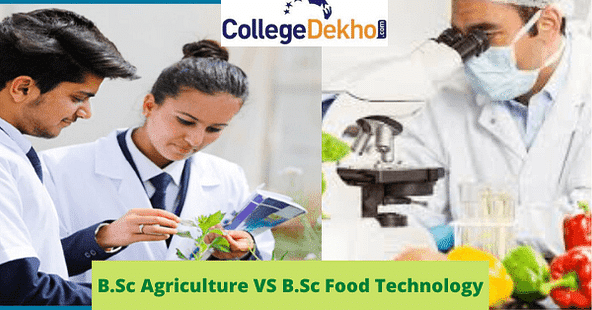BSc in Agriculture and BSc in Food Technology are the two most sought-after courses in sciences and agriculture stream. Both courses are equally important and offer various career opportunities.

A BSc or an undergraduate degree in a specialisation under the agriculture stream is the combination of both theoretical and practical application in various activities that involves crop cultivation, food products manufacturing, packaging, quality analysis of soil and many more.
Many of these courses are industry-driven and offer huge opportunities for jobs, research, and businesses. The development of the agricultural sector in India is ever-increasing and career options are numerous.
A degree in agricultural sciences will help students study the practice of farming and food manufacturing at both the micro-level and macro levels. It helps them explore environmental friendly solutions to provide enough nutritious food to a global population.
In India, there are various courses that a student can opt for under the agricultural stream. Among all the Agricultural courses, BSc in Agriculture and BSc in Food Technology are the two most sought-after courses after Class XII. Both the courses are equally important but they have a different curriculum and offer different career opportunities after the competition of course.
A student after Class XII may not be sure about which among the two-course BSc in Agriculture or BSc in Food Technology they should choose. To help such students take the right decision, we have come up with a comparison between BSc Agriculture and BSc in Food Technology course.
Course Comparison
Name of the Course | BSc in Agriculture | BSc in Food Technology |
|---|---|---|
Duration | 03 Years | 03 Years |
Eligibility | Class XIIth qualified from a recognised University from Science stream (PCB/M) | Class XIIth qualified from a recognised University from Science stream (PCB/M/Home Science) |
List of Entrance Exams (Top 5) |
|
|
Admission Process | Entrance test-based and merit-based both | Entrance test-based and merit-based both |
Fees | INR 5,000/- per semester onwards | INR 20,000/- to INR 60,000/- per semester |
Top Job Roles after Graduating |
|
|
Top Recruiting Organizations (top) |
| N/A |
Career Growth (basic Details) | An Agriculture graduate does not have a dearth of job opportunities with a BSc degree plus he/she can go further with an even higher degree | Food Technology graduates have a plethora of option after completing studies from joining a company or go for higher studies |
Highest Salary Range | INR 8,16,000/- per annum | INR 8,27,000/- per annum |
Average Salary | INR 3,00,000/- LPA to INR 6,00,000/- LPA | INR 3,50,000/- LPA to INR 5,00,000/- LPA |
Top Colleges (any 5) | ||
List of Government Jobs |
|
|
List of Government Recruitment Tests |
| |
Related Links |
Reasons to pursue BSc Agriculture?
Before choosing a BSc Agriculture course, ensure that you are interested in pursuing the course. For this, you can analyze the scope and subjects associated with the degree programme and make sure that you want to make a career in similar fields. Here are some of reasons why you should opt BSc Agriculture course after Class XII:
Students who are interested in the agriculture field and want to learn about the processes involved in farming and agriculture can pursue BSc Agriculture course. It is also a good alternative for BTech or BE in Agriculture engineering.
Those who want to make a career in the Agriculture sector and are interested in job roles like Agronomist, Agriculture Scientists, Plants breeding, Soil Analysts etc can opt BSc Agriculture course after Class XII.
India is an agrarian country and BSc Agriculture is one of the courses which will never run out of job opportunities. Qualified professionals are always valued and needed in the when agriculture sector.
After BSc Agriculture there are ample opportunities in research and technology-driven jobs roles in public and private sectors like you can go civil services, opt for a job in ICAR, bank or insurance companies, and even work in dairy and poultry farms.
Also Read: BSc Agriculture Admissions in India
Scope of BSc Agriculture
Candidates who hold a BSc Agriculture degree have numerous job opportunities and they can choose the job role based on their interests. Some of the job roles available for BSc Agriculture graduates are as follows:
Agronomist
An agronomist acts as a middle man for farmers and researchers. The nature of the job role for an agronomist varies. An agronomist performs experiments in agricultural labs. They also look after the health of crops and their nutrition values. They do research and use their knowledge to recommend farmers related to agriculture activities.
They also guide farmers about the latest scientific developments in the field of agriculture and help them practice the best activities for agriculture production.
Indian Forest Service- IFS Officer
Indian Forest Service is one of the civil services in India. A candidate can with a BSc Agriculture degree can clear the UPSC IFS examination and choose to become an IFS officer. It is the reputed post that an agriculture graduate can hold.
Agriculture Field Officer in Banks- AFO
BSc Agriculture candidates can opt for a bank job as an Agriculture Field Officer. For a job role in public banks in India, the candidate can appear in IBPS SO examination which is conducted in by IBPS every year. AFO is a scale post and such professionals are responsible to lend and disburse agriculture loans.
Soil Scientist
A soil scientist is a professional who is highly qualified to analyze and interpret the quality of soil for agriculture. The quality of soil is essential for environmental sustainability and the quality production of food crops.
Through research and analysis, a soil scientist ensures that the fertility of the soil is maintained for farming and they have enough minerals for the production of food crops.
Also Read: List of BSc Agriculture Colleges in India
Reasons to pursue BSc Food Technology
Analyse the scope, career options and your interest before choosing the BSc Food Technology. Here are some of the reasons which will help you to analyze whether you should pursue the BSc Food Technology course after Class XIK or not:
Students who wish to possess knowledge of diet, fitness, nutrition and processing of food products before packaging can pursue a BSc Food Technology course.
BSc Food Technology is a good degree choice for candidates who want to make a career in the food manufacturing and packaging sector. The knowledge about various processes of food production like hygiene marketing and finance helps a student achieve a successful career.
There are thousands of food industries in India. These industries need professionals who could check the quality of food manufacturing and packaging. Thus, the demand of food technology graduates is always high.
After the completion of the BSc Food Technology course, candidates can pursue MSc in Food Technology from top institutes in India like Central Food Technological Research Institute, Indian Institute of Crop Processing Technology etc. These institutes will offer them a better platform for research work and help them emerge as expert scientists in the field.
Also Read: B.Tech Agriculture Engineering Admission in India
Scope of Food Technology
Candidates who successfully complete the BSc Food Technology course can opt for various job roles Some of the job roles available for BSc Food Technology graduates are as follows:
Food Technologist/ Food Scientist
A Food Technologist/ Scientist is a professional whose job role is to ensure the safety, hygiene, and nutrition of food products are maintained. They are also involved in various research activities on food additives and develop substitutes to make sure that the food item is healthy and safe for consumption.
Food Production Manager
A food production manager acts as in-charge of the production unit and oversees procedures involved in food production. They look after the standards, quality of raw material, and safety and hygiene of employees.
They ensure that all the procedures of production comply with the standard rules and regulations defined for food production.
Food Handler
A food handler is a person who looks after all the phases of food distribution until it reaches the final consumer. He is involved with the preparation, manufacture, processing, packaging, storage, transportation, distribution, supply, and sale of the product.
Food handling is an important job role to ensure that food products do not tamper in any way before it reaches the consumer.
Food Inspector
A Food Inspector is responsible for inspecting raw materials like grains prior to its usage in the production of food items. They inspect the hygiene of ingredients, and containers used for production and ensure that the food packed in free from any kind of contamination.
It is an important job role to ensure the quality, standards and hygiene of food items.
Also Read: List of BSc Food Technology Colleges in India
Hope the above comparison will help you choose the right course. For the latest Educational News and Updates, Stay tuned to CollegDekho !
Are you feeling lost and unsure about what career path to take after completing 12th standard?
Say goodbye to confusion and hello to a bright future!

Was this article helpful?




















Similar Articles
OUAT vs COA Bhubaneswar: Which is Better for Agriculture Studies?
List of Documents Required to Fill MP PAT Application Form 2025
Preparation Tips for MP PAT 2025: Best Books, Exam Pattern, Marking System
Bihar Agriculture Admissions (BCECE) 2025: Results (Out), Counseling (Soon)
List of Colleges Accepting MP PAT Score 2025
List of Colleges Accepting CG PAT Scores: List of Govt and Private Colleges